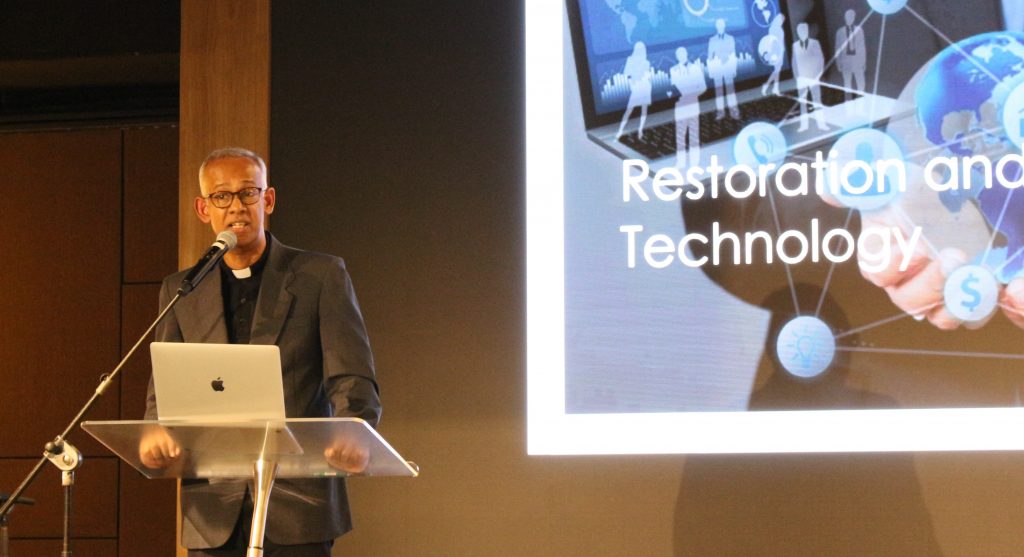“We need to place our theology at the feet of the people of Asia” tells Roman Catholic theologian Fr. Clarence Devadass at the pan Asian theological summit

Delivering the fourth thematic address on a sub-theme of CATS-IX, ‘Restoration: Towards the Will of God’ on the final day, Fr. Clarence Devadass, a Roman Catholic theologian called upon Asian theologians by saying, “We need to place our theology at the feet of the people of Asia.”
Revisiting the instances of restoration in the Bible, and relating them to the many facets of contemporary human life situations, an Executive Secretary of the Federation of the Asian Bishops’ Conferences (FABC) shared five ‘spokes of the wheel’ of restoration, in terms of ‘justice’, ‘healing’, for the ‘common good’, ‘eco-equilibrium’, and ‘technology’.
Fr Devadass spelled out five shifts needed in Asian theological thinking constituted: shifts from ‘exclusivity’ to ‘inclusivity’; from ‘static binaries’ to ‘dynamic dialogical interplay’; from ‘ideological systematisation’ to a ‘cultural systematisation’ of theology; from ‘the world of ideas’ to ‘the world of practical life and mission’; and from ‘theo-centric’ to ‘theo-praxis’.
He asked if Asian theologians could collectively offer a creative theological narrative that could be effective in the work of restoration. In order to work towards greater restoration, Fr Devadass exhorted the theologians present to deconstruct indoctrinated theological methodologies.
“What is significant needed to start from the point of God’s initiative towards restoration as it has always been God’s intention to restore us to ‘His image and likeness’”, Fr Devadass shared.
As many countries in Asia are still developing, he said that the churches in Asia have a unique call to respond to the issues of poverty, hunger, discrimination, economic migration, corruption, and several others. He further added, “Apart from all human effort (for restoration and healing), we must also allow the grace of God to heal the world and us, because only God can heal.”
Ethnic and religious conflicts most often grounded in Asia’s plurality are threats to the cohesion and stability of society. In light of this, creative restorative justice was to restore a sense of equilibrium for ‘all persons, communities, and nations connected,’ said Fr Devadass.
Fr. Devadass, who coordinates the theological programme desk of the FABC, stated, “Given that most Christian churches are minorities in their countries, relationships with the wider ecumenical community was to be built on ‘dialogue’. For the purpose of the common good, the Church must demonstrate that dialogue is more than just the communication of a truth. In fact, evangelization is at the service of dialogue, and dialogue at the service of peace. For Asia, dialogue must open up new horizons that make clear the path towards harmony and peace for the common good of all people.”
Fr Devadass also spoke extensively on the role of technology, and how the Church can strive to be more relevant for young people to participate more fully.
Two young Asian women theologians, Dr Sawako Fujiwara from Japan and Rev. Indah Sriulina from Indonesia, responded to Fr Devadass’ presentation and they asked, “Given the emerging situation that young people seem to believe in Jesus and not in the Church, how do we modify the language of the Church for it to be palatable for young people?”
Responding to the presentation of Fr Devadass Prof. Dr M. Mammen Varkki commented on the deeply disturbed situations by the increasing inequality in the world. Quoting the arguments by Thomas Piketty in his famous work ‘Capital in the Twenty-First Century’ that the degree of inequality is not just the product of economic forces; it is also the product of politics, Prof. Varkki reminded the Asian theologians “the need for a radical shift in Asian theological thinking to understand, analyse and respond to the increasing inequalities intensifying more dehumanization in our societies”.
Rev. Dr Justin Moses, a young theologian from the Senate of Serampore University suggested the need for a reinterpretation of restoration as ‘mission’ for the healing of all communities.
A Communique prepared by a representative group of Asian theologians that reflects commitment to developing unique contextual Asian theologies was discussed in detail towards the end of CATS.










